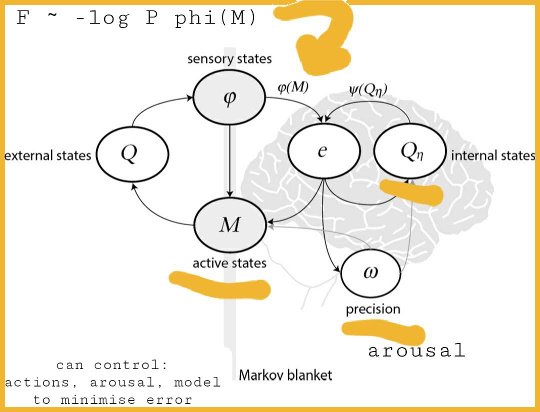In which I make the following points: 1. The Cortical Fallacy is Real, 2. Consciousness is (Essentially) Not Substrate-Free, and 3. Consciousness and Intelligence are Not the Same Thing
Read moreSleep Paralysis, the Mind-Body Problem, and the Non-Self
[reading time 5 minutes]
Last night I had my first full episode of sleep paralysis.
It started with this weird-ass dream (see supplementary post). I half-noticed a sound in real-life which ended the weird dream about eating penguins. This was the beginning of the real strangeness. The sound (which I now believe was a high-pitched moment of music in a YouTube video my daughter was watching) became immeasurably loud in my mind - out of control - as if amplified in a feedback loop. Eyes still closed and half-in and half-out of sleep, I had the urge to scream, partly to get whomever was making the sound to shut up, and partly so I could hear my own voice and in that way take a sounding of the depth of noise I was at sea upon.
Details of the Episode
My body lurched in real space and I opened my mouth. I had the sensation of screaming but was realizing the sound was completely in my mind - or was it? Confused and scared, I opened my eyes, and at that moment my mind and senses were fully conscious of reality but my body was still locked in sleep. I had stopped the internal pressure - the will and command to scream - and was now looking at my cat about a foot away from my face, just ignoring my ridiculous situation in his cat way. My body was canted over in some unknown fashion, seemingly tilted at an impossible, gravity-defying angle, but also not. I think I tried to move my arms and legs and experienced no movement as if I at once applied the force to both move and keep them in place. I could now hear the veridical music of my daughter's YouTube video and knew she was alright (when I first heard the runaway noise I also had a feeling that she was in trouble), so I called for her help. No sound came from my mouth. My mouth could not even form the shape of words, despite desperate effort. I could push air, almost - summon a pressure with my breathing muscles - but still no sound came out. I became incredibly fearful, such that I lay there savoring it - I had never felt such a way in my life and recognized the singular experience. I was at once scared, humorous, relaxed, and in awe of myself.
Still unable to move except for automatic breathing and the beating of my heart, I was finally able to produce a sound. I tried to say "help" or yell my daughter's nickname, which came out as a pathetic "ugh-UGH". I had heard myself make this sound two other times in my life. The first was in post-op for a tonsillectomy, I noticed someone yelling and as I wished they would stop I realized it was I who was making ludicrous noises. The second was in waking from a random nightmare.
By now my daughter had heard my sounds and was asking what was going on. I wanted to explain but couldn't. Confident, somehow, that voluntary movement would soon return to my body, I was finally freed and able to tell my daughter I was having a bad dream. Later that morning I fully explained the paralysis.
Philosophy of the Episode
This strange happening pokes its fingers in the eyes of many philosophical topics. First of all, when I say "voluntary movement", I do not mean a return of my free will - for there is no free will, only determinism. I only mean the causal connection between my relevant neural circuitry and subsequent motor responses.
But the more profound insight here - the more tenacious eye poke - is in the face of the mind-body problem. That is, do we have a soul, or is our consciousness wholly the result of an assemblage of material parts?
If we have a soul - a non-material driver of consciousness - does it depart during sleep? If so, where does it go? If not, how can the soul effect a half-sleep, half-awake state such as sleep paralysis?
As usual, it is much simpler and profound to do away with such a thing as a soul. So how then does a material consciousness express itself liminally between sleep and wakefullness? There are proposals for the neurological mechanics of sleep paralysis, such as this paper which discusses an abnormal interplay between cholinergic and serotonergic neural pathways.
This interplay reminds us that although ultimately we as living beings are constructed from one basic material "stuff" (call it, say, quantum particles), at the relatively low entropic levels which allow for life, this stuff has organized and differentiated such that each of us is not really one singular "self". This is true even at levels of cognitive organization well above the simple neurotransmitter level (whether cholinergic, serotonergic, or what-have-you). Consider, for example, Jeff Hawkins' (and his team's) Thousand Brains Model of Intelligence. This multi-self paradox of self is so pervasive in the tree of life, it is even present pre-cognition, evolutionarily speaking, for example, in the quorum sensing behavior of bacteria.
Anyone familiar with Buddhism will find much to ruminate on here. Or not :-)
If you do choose to further reflect here, think about this: if the brain is really more like a thousand mini-brains, or merely chemicals which get to "vote" to establish thought in the overall brain and behavior in the overall organism - what, truly, is the self? If self is the result of a vote, then self is a concept, not a thing. To be not-a-thing is very profound.


